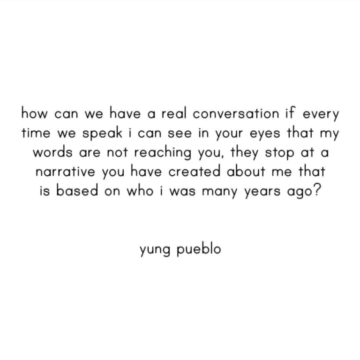
I cannot stop thinking about this post from Yung Pueblo this morning. I feel myself trapped by the narratives that others have created for me based on a past self, or even just a simple moment in time. As we interact, I find myself directed by that person into those past versions of myself, in the ways that they no longer listen to the actual words that are coming out of my mouth.
Years ago, when I was just starting out teaching, I struggled (like any new teacher). I had yet to find my voice and the depth of my heart in my teaching. I got some mentoring, started working with a teacher, and I got better. In the locker room of the gym where I was teaching, I heard two people talking about me. One was saying that she did not like my class because of some pattern or other (I no longer remember the details). I knew what she was talking about and not only was I not doing that any more, I had not done it in over a year. I knew in that moment, that I would always be held to a former version of myself and my teaching. I decided right then to leave that job because I would not be allowed to grow.
We all experience this within our family structures. We do all kinds of personal growth work to improve ourselves. Then we go home and they treat us like we were when we were kids. We can hardly get out of the trap. Even worse, we treat our families like they were when we were kids. How can we win?
How do we hold ourselves to past versions? What is the narrative that you are telling yourself about yourself? Think about all the ways you shut yourself down and limit your experiences based on some narrative you hold about yourself. There are so many stories that we tell ourselves that limit our growth as individuals. I wonder how many profound lessons we have missed because of some self-imposed limitation we tell ourselves.
I am drawn to this quote for the reasons I outlined above. I am also drawn because of the implications it has within our current reality. We are being asked to change thought patterns and beliefs. For some this change is so drastic. I wonder if some of the people clinging to past beliefs are doing so just because they cannot let go of the narrative they have about themselves and the world. When we stay the same, we know what we will get. If we start to acknowledge that people change all the time, we are dealing with the unknown, which is scary.
The only way I know to move past self-imposed limitations through discomfort. When I find myself in a place of unease, aggravation, or an argument, I question whether I am holding on to what no longer serves. Am I willing to let go and allow my perspective to expand to include another’s perspective? Is this perspective that I am clinging to really of benefit to me? It is not easy work and it is necessary work if we want to live a life of freedom.
Love this 🌈💜🙏
Excellent. Applies to family, work, and volunteer groups and the same assumptions.
“The only way out is through.” = face the discomfort and fear and move on one small changed behavior at a time.
You are so right on!!!
😘🙏🏻🌈😇
😘🙏🏻🌈😇love
Wow, Its a great topic.